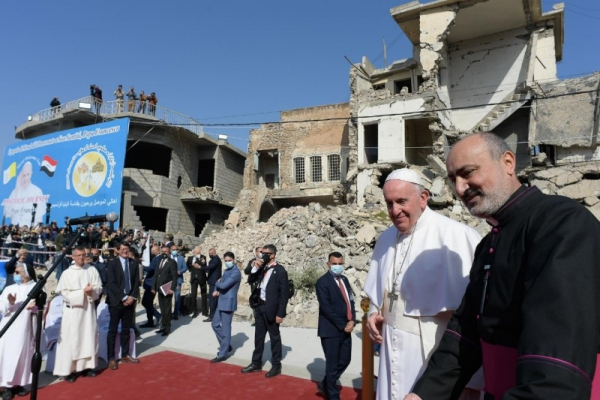
An Islamic Studies expert released a report last Wednesday that states how Pope Francis' Apostolic Journey in Iraq last March 5-8 highlighted the dwindling number of Christians there.
According to "Alien Citizens: The State And Religious Minorities In Turkey And France" author Ramazan Kilinc, the Pope's visit in Iraq raised the awareness that Christians there face.
"The Iraqi government invited Pope Francis to visit. The president of Iraq, Barham Salih, described the visit as 'a message of peace to Iraqis of all religions'. Media reports have quoted a Vatican source as saying the Pope aims 'to comfort Christians who, amid wars and conflicts, have been forced to flee from Iraq'," he wrote in an article for MercatorNet.
To which he added, "One cannot know if the pope's visit will help Iraqi Christians heal from many years of suffering, but it will definitely bring public attention to their situation."
"In the past two decades, the Christian population in Iraq has fallen by over 80%. The 1987 Iraqi census reported that there were 1.4 million Christians in Iraq, and today it is estimated that the Christian population is less than 250,000. Spurred by political instability and war, many Christians have immigrated to other regions, including North America, Western Europe and Australia," he stressed.
A similar report by the Pakistani Christian Post said that the Pope's visit reassured Iraqi Christians of his prayers as their number dwindled due to years of Islamic attack and persecution. It cited the Pope leading an interfaith ceremony where he prayed "for the victims of war" in Mosul,in northern Iraq, the Nineveh Plains, and in Qaraqosh.
"We all hope that this visit will be a good omen for the Iraqi people," expressed Adnane Youssef to reporters on the Pope's visit being a Christian from northern Iraq.
"We hope that it will lead to better days. This very important visit will boost our morale after years of difficulties, problems, and wars," echoed Iraqi Christian leader, Reverend George Jahoula to Pakistani Christian Post.
In addition, Vatican News reported that the Higher Committee of Human Fraternity hailed Pope Francis' concluded Apostolic Journey to Iraq "as a crucial moment for promoting tolerance, inclusiveness, and human fraternity." It cited Al-Azhar University President Professor Mohamed al-Mahrasawi and member of the committee who said Pope Francis' visit to Iraq provided the Iraqi people healing from their wounds caused by years of wars and destruction.
The report written by Kilinc, who is a University of Nebraska Islamic Studies Program Director and Political Science Associate Professor, presented material from his recent book that examined the status of religious minorities and how international factors influenced them. He raised in his report that the decline of Iraqi Christians came from a series of international interventions that started in 2003 with the invasion of the United States.
He pointed out that the U.S. invasion of Iraq led to the "large-scale persecution of the Christian population" since the "ousting of Saddam by U.S. troops led to a power vacuum in which sectarianism and instability helped create the conditions for the rise of extremist groups such as al-Qaida in Iraq from 2004".
In addition, Kilinc explained that the Saddam Hussein's Deputy Prime Minister Tariq Aziz, who served the Cabinet from 1979 to 2003, was a member of the Chaldean Catholic Church and this influenced how Hussein's government treated Christians better. He referenced religion scholar Kristian Girling in saying that Christians were protected and even experienced prominence in cultural and business life in exchange for "their acquiescence to Saddam's authoritarianism," which is renowned to repress ethic and religious groups that included the Kurds and Shiites.
He narrated that after Hussein left the picture, Christians experienced a series of violence in the form of attacks, kidnappings, and killings. This prompted many Iraqi Christians to flee. He cited a report of the U.S. International Religious Freedom that said more than half of Iraqi Christians have fled the country by 2013. This was aggravated by the Islamic State group who came in 2014 and overtook the country forcing more than 100,000 Christians to flee Mosul and the Nineveh Plains.
Even when the Islamic State group was defeated in 2017, Kilinc added, Christians continued to flee because the Shiite militant groups that helped the Iraqi government defeat the Islamic State group turned out to be the ones who attacked the country next. After the Shiite militant group was tamed by the government, "skirmishes with them over properties and lands" became another reason for many more Christians to flee Iraq.
As per Kilinc, Iraqi Christians can be classified according to ethnicity as Assyrians or Syriacs. The Assyrian communities are majority Chaldean Catholics (two thirds) and 5% members of the Assyrian Church of the East and members of the Ancient Church of the East. While 10%-15% of Iraqi Christians are Syriacs who are either members of the Syriac Catholic Church headquartered in Lebanon and the Syriac Orthodox Church headquartered in Syria. The remaining Iraqi Christians are Armenians and Arabs and other small ethnic groups.












